Lisa Hammond was born on 2 June 1983 in Chichester, West Sussex and is best known for her portrayal of the sharp-tongued market stall holder Donna Yates in the BBC’s EastEnders. Notwithstanding her birth in Sussex she considers herself to be a Londoner through and through saying that she loves the city and hates the country.
I think I’m from London. I feel very connected with ‘city’. I like the fact that if you might fall over, someone might step over you. That’s why I like it here… In London I could be fat, thin, tall, small, wheelchair user – no one cares.
When Lisa was seven, her parents separated and so she and her elder sister grew up apart from their dad. Despite this, she has always stayed in touch with her father but consequently she knows little about his family. She rarely saw her paternal grandfather, who died in 1995 and her grandparents on her mother’s side died when her mother was a young girl.
So I don’t know anything.
Lisa begins her family history research with her paternal Grandfather, who had been christened Henry Hammond, but was known in the family as Harry. The only information that she has was that Harry had been in the army, but not a lot more than that. To try and find out more she visits her Uncle Chris who had stayed with his father Harry after his parents had also separated. Chris has the family photographs and is able to tell Lisa that his father would never talk about his experiences in World War II. Lisa feels that she wants to discover more about this time to see if it sheds light on why he was so reticent about it.
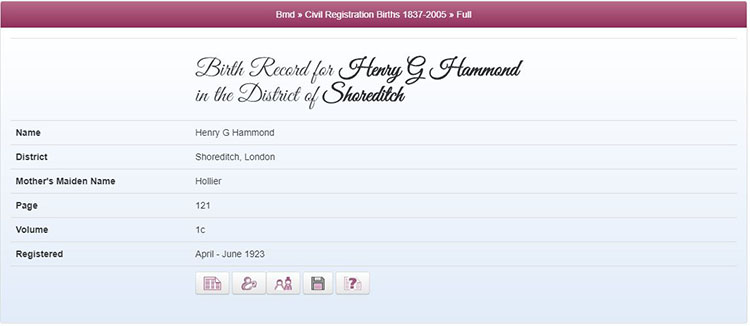
From research online, Lisa learns that her grandfather Harry was born in 1923 in Shoreditch, which we can see from the birth record for him on TheGenealogist. When Harry was 16 years old, his job had been as a wheel-builder. His father having died by this time, Harry lived with and supported his mum, Minnie. Harry would have been in his teens when the War broke out in 1939 and so it was most likely that Lisa’s grandfather would have been called up to serve in the army. Her research finds several H Hammonds on a casualty list and so she heads to the Imperial War Museum to see if she can discover more about what happened to Harry.
At the Imperial War Museum, Lisa discovers that her grandfather had, indeed gone to War having joined the 10th Battalion of the Royal Berkshire Regiment in 1941. Six months after joining up and still only 18 years old, Harry arrived in Salerno, Italy to take part in the Italian Campaign. This was a treacherous and costly invasion that was aimed at capturing Rome from the enemy. The allies had to take a mountainous ridge south of Rome named Monte Camino if they were to reach their objective of capturing the city. In November 1943 Harry’s battalion came under a series of German counter attacks. Confusion reigned and in it Harry Hammond went “missing” though this didn’t explain whether he’d gone AWOL, been killed or wounded, or captured by the other side.
I’d love to find out [what happened]. Well… it’s a bit of a weird one, isn’t it; I don’t know whether I want to find out. It sounds horrible.
In the Who Do You Think You Are? programme Lisa is able to meet a 97-year-old veteran of the Italian Campaign, Doug Weyhaupt. His regiment fought alongside Harry’s at Monte Camino and so he could tell her about the danger associated with their position in rocky terrain where it was impossible to dig in. Having the German forces looking down on them meant that the allies were particularly vulnerable to snipers. Doug is also able to explain what had happened to Harry pointing out the line on his record that reads “POW”. Harry, it turns out, spent more than two years as a prisoner of war.
That’s a long time. So I’m not surprised that he didn’t want to talk about it.
I feel a bit shaky, ‘cause it’s becoming more of a reality for me now.
To find out more about her grandfather’s time as a POW, Lisa is able to consult with the British Red Cross Society. The records that they show her detail that Harry was taken to Germany, where he was locked up in a series of three different camps. Back home his mother, Minnie, would eventually have received an official postcard informing her of her son’s capture.
This must have been horrific for Minnie, my great-grandmother. I don’t know what’s worse…whether it’s worse to not know anything or to start imagining what the conditions are like for your loved one…
Lisa is told about the overcrowded prison camps, the hard labour Harry would have been made to do building railways, and the meager rations that he would have had to survive on. Many of the prisoners of war became severely malnourished during their time in the camps.
He did not talk about the War. So I wonder how, mentally…where he put that.
Lisa is curious to find out what had happened to Harry when he was released. The research shows that in April, 1945, Harry Hammond returned to London. Unfortunately the east end home that he had previously shared with his mother Minnie had been bombed and completely destroyed in the Blitz, though Minnie was unharmed. On returning to Britain he eventually went to a Civil Resettlement Unit (CRU) in Northern Ireland and the programme speculates that he may have taken a place this far from home because the waiting list was shorter at the Northern Irish facility than at others. The purpose of the CRU was to make it easier for former POWs to make the transition to civilian life. Up until the mid-1940s, it had been assumed by the authorities that POWs had not been as badly affected as soldiers returning from the battlefields. By the time Harry returned, however, the army psychiatrists had changed their thinking and now encouraged former POWs to voluntarily attend a CRU to get help adjusting to peacetime life. Harry had spent a long time as a prisoner and so his medical card described him as suffering from “chronic field anxiety.” The researchers found that after his time in the CRU Harry seems to have adjusted reasonably well and remained as a soldier serving in the peacetime army even receiving a favourable report as “honest and trustworthy and a good worker under supervision.”
Access Over a Billion Records
Try a four-month Diamond subscription and we’ll apply a lifetime discount making it just £44.95 (standard price £64.95). You’ll gain access to all of our exclusive record collections and unique search tools (Along with Censuses, BMDs, Wills and more), providing you with the best resources online to discover your family history story.
We’ll also give you a free 12-month subscription to Discover Your Ancestors online magazine (worth £24.99), so you can read more great Family History research articles like this!
By 1947, Harry and Lisa’s grandmother Lillian had got married and they went on to have two sons: Lisa’s father Peter, and her uncle Chris. Lisa’s grandfather died in 1995 at the age of 72 so she visits Worthing Crematorium to pay her respects to him.
I know much more about him than even his sons do.
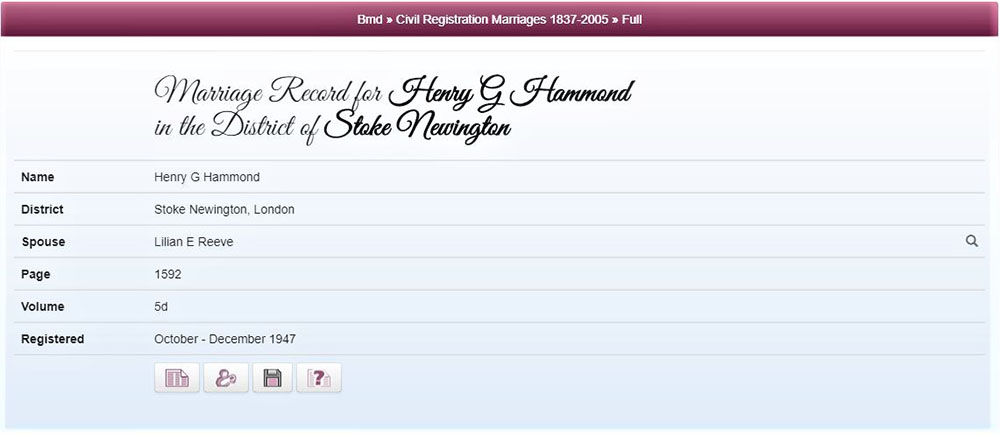
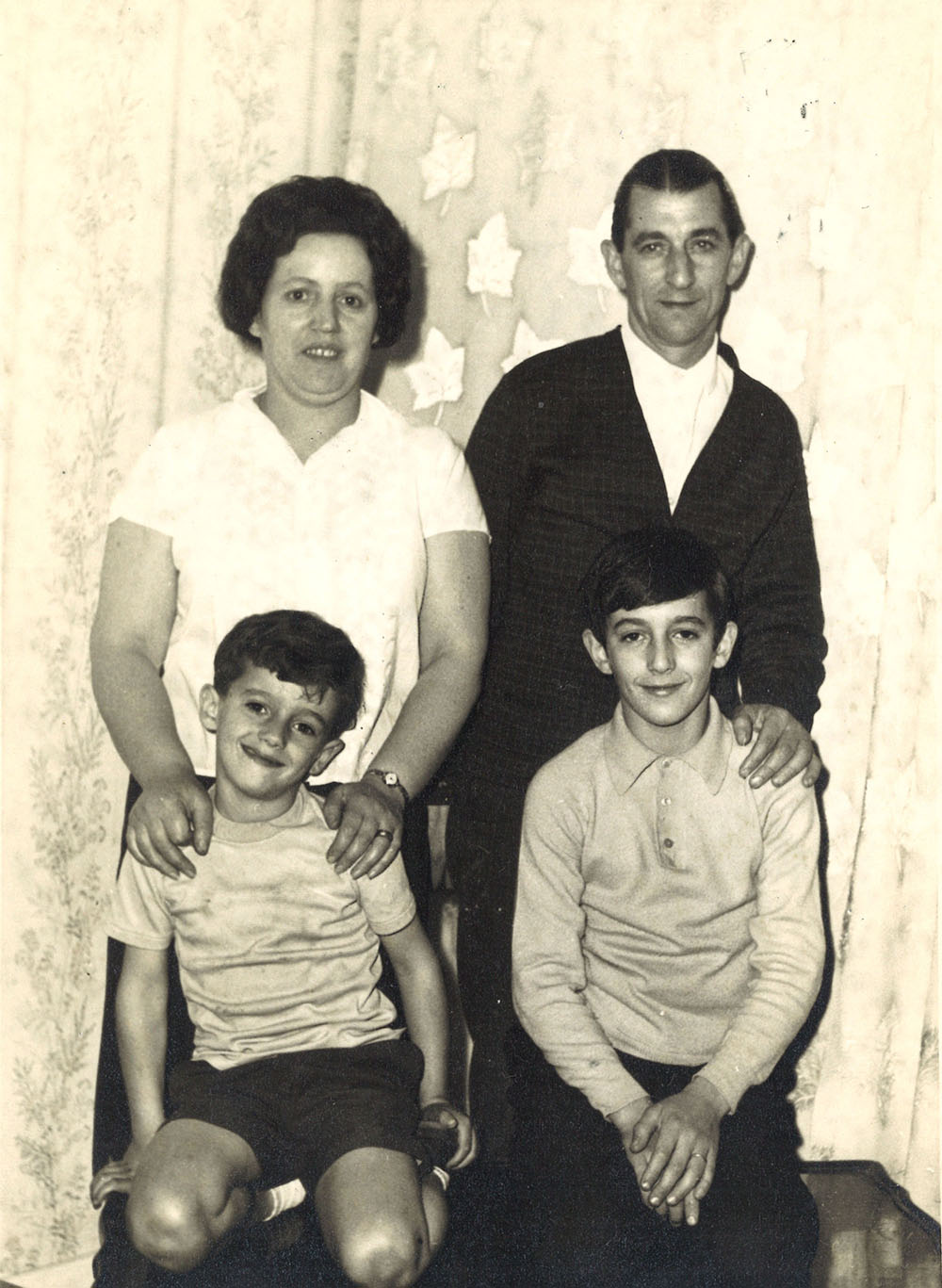
The Maternal Line
To then find out more about her mother’s family, Lisa visits her mum Janet in London. Janet had lost her parents when she was very young, but she had already done some research into her father’s side the Hilditch line and also made up a family tree.
I’m expecting it to be fully London stock…
This turns out to be correct, as on the tree she notes that going right back to her 3x great-grandfather William Henry Hilditch, b. 1797, the family had been living in London’s east end near the docks. We can use TheGenealogist to look at the 1851 census record, and that shows us that William Henry Hilditch was then living with his wife Ann and his three children in the Limehouse area and his occupation was as a Lighterman on the Thames. Lisa was not sure what a Lighterman did but had guessed that it has something to do with the docks.
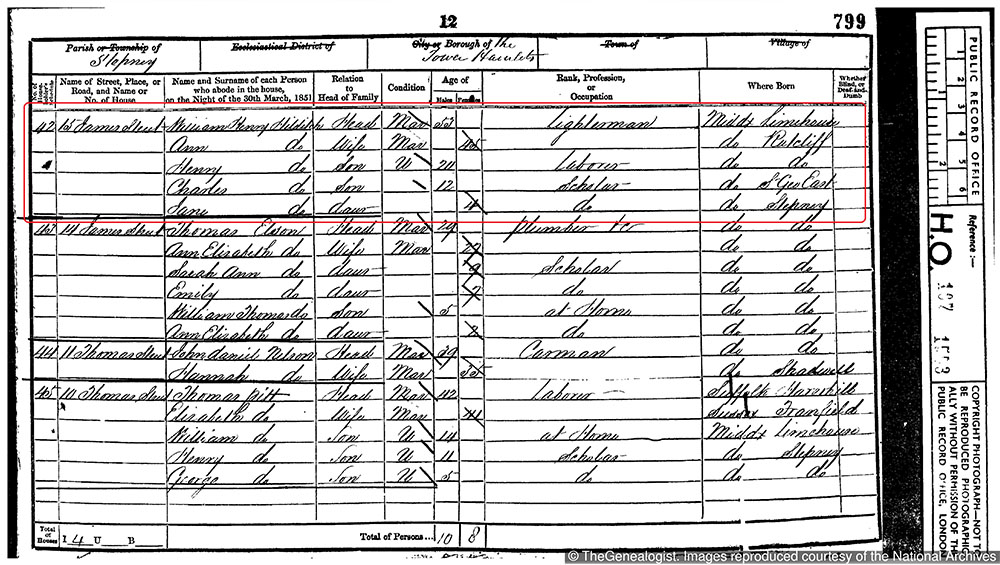
Lisa meet a historian in the TV programme at a pub in Limehouse who was able to explain to her that men like her ancestor maneuvered their open barges (lighters) alongside ships in the docks, loaded them up with cargo and took this to the riverside warehouses. These Thames lightermen were self-employed and so the amount of work available could be unpredictable.
A bit like acting! It’s like champagne one minute and saver’s beans the next…
Lisa’s 3 x great-grandfather William struggled to make ends meet for his family and so this lead him to change jobs and become a Deputy Corn Meter checking the weights of corn sacks that came into the docks.
A search for William in other records finds him mentioned in the will from 1835 of Joseph Hilditch, his uncle. The will was proved in the Prerogative Court of Canterbury wills and so it can be seen on TheGenealogist and this reveals that Joseph bequeathed to his brother’s wife Mrs. Elizabeth Hilditch (William’s stepmother and the widow of William’s father Richard) and to his nephews Joseph and William Hilditch the tiny sum of one shilling each. The wording is clear to see where it reads: “had they not behaved in the most rude and unfeeling manner toward me they would have shared a larger portion of my property.”
‘Well we all know that rude and unfeeling runs in the family, so maybe we got it from them’ says Lisa.
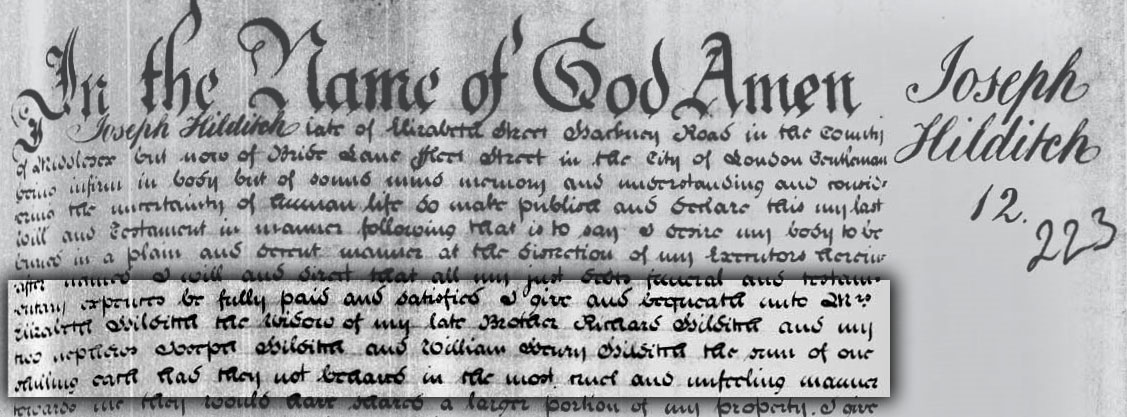
In order to try to find out why William, his brother and their stepmother had been left such a small sum by their uncle, Lisa consults a specialist historian in the programme. It seems that William’s uncle Joseph had done this on purpose in order to make a public statement. Joseph Hilditch had been a wealthy man worth £5000 in 1834 roughly half a million pounds in today’s money and yet he decided that they should only receive a shilling each. After his demise, William’s stepmother Elizabeth and brother Joseph went to court to fight the validity of the will. The testimony found by researchers suggest that shortly after Uncle Joseph made a previous will in favour of Elizabeth and her stepsons, they had him put into the “Brixton Madhouse” under false pretenses. Here poor Joseph Hilditch was kept for six upsetting weeks until the authorities decided that there was nothing wrong with him. Needless to say Elizabeth and Joseph Jnr, his nephew, were unsuccessful in their legal challenge, and so the will that effectively cut them out of their inheritance was left as the valid. As a result of this Lisa’s 3 x great-grandfather William continued working on the docks without the benefit of a bigger inheritance.
The court case reveals more interesting family information for Lisa, especially with her declared dislike of the countryside the Hilditch family originally came from Wales. In 1759, Lisa’s 4 x great-grandfather was born in Denbigh, North Wales. His father Lisa’s 5 x great-grandfather, another Joseph was a farmer.
Farmer! That was what I was saying to my mum. I was like, ‘oh my god, can you imagine if we’re farmers!
Heading to Denbighshire, Lisa is able to meet the Welsh historian Nia Powell at St. Marcellus Church. Nia is able to explain that her research on Lisa’s Hilditch line shows that her ancestors’ status goes up the social scale the further back she went in the records. Lisa’s 5 x great-grandfather Joseph was a yeoman farmer, and then her 7 x great-grandfather another William was warden of the church that they had met in and could even be found on a plaque from 1720 in the church. Finding this William’s marriage bond from 1701 reveals that he was referred to as a gentleman. William’s wife Jane came from “The Lodge” and so Lisa and Nia are able to visit the grand house. Jane’s grandfather who is Lisa’s 9 x great-grandfather was named Thomas Vaughan and it was from him that the property passed down through the family.
The episode of Who Do You Think You Are? sees Lisa accept that she has rural roots, but she is only too glad to be returning to the pollution and the rudeness of her beloved London.
Sources: Press Information from IJPR on behalf of the programme makers Wall to Wall Media Extra research and record images from within TheGenealogist BBC Images






